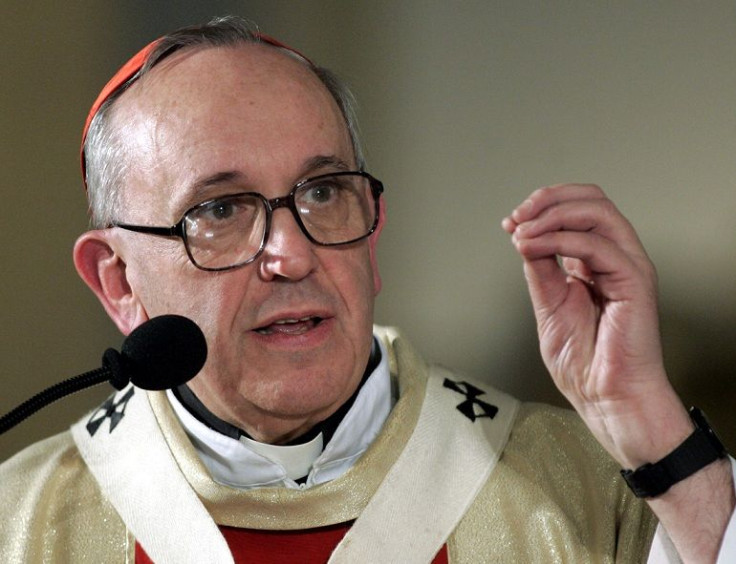Pope Francis I: First Jesuit Pope Shatters Centuries Of Mistrust

Jorge Mario Bergoglio may have chosen to name himself Francis I after the patron saint of Italy, St. Francis of Assisi, but His Holiness is not a Franciscan. He is a Jesuit, the first member of the Society of Jesus to be elected pope. He is also the first member of a religious order to become pope since 1831, when the conclave elected Gregory XVI, a Camaldolese Benedictine monk.
Gregory, also the last pope who was not a bishop before his election, was a staunch conservative who reigned until 1846. Among the 34 popes who were members of a religious order, the Benedictines dominate with 17. Franciscans have had four, but the Jesuits never have had one of their own as pope despite a long history – the order was founded in 1540 by Spaniard Ignatius of Loyola – and a prominent role in the church.
The choice of a Jesuit -- and one who came "from the ends of the Earth" at that, as Bergoglio himself said when addressing the crowd in Saint Peter's Square on Wednesday, joking about being from faraway Argentina -- was not expected.
"I'm excited because I love all that the Jesuits stand for but I'm honestly really surprised," said Cathy Landry, a junior at Fordham University in New York, one of the leading Jesuit educational institutions.
The order is “noted for its educational, missionary and charitable works, once regarded by many as the principal agent of the Counter-Reformation and later a leading force in modernizing the church,” according to the Encyclopedia Britannica. The Encyclopedia also picks up on the controversy regarding the Jesuits, which “have always been a controversial group regarded by some as a society to be feared and condemned and by others as the most laudable and esteemed religious order in the Catholic Church.”
It’s also the largest single order in the Catholic church, with more than 19,000 members by its own count, and a presence on every continent – including Antarctica, where Jesuits have been chaplains and, in keeping with their order’s reputation as the church’s intellectual powerhouse, even scientists.
So why did the Jesuits, with their unparalleled reach, never get to the highest office in an institution they have such a huge part in?
For starters, they have a reputation. They may vow blind, total obedience to the pope and their own superiors, “perinde ac cadaver,” like a corpse, in St. Ignatius’ Latin phrase, which reflected the military background of the order’s founder. But in practice they are anything but dumb bodies.
Father Thomas Reese, a Jesuit and former editor in chief of the order's weekly magazine America, told CNN in 2005 that the word "Jesuit" had become synonymous through the centuries with scheming, and that their very reputation as the most free-thinking of Catholics had made them suspect in the eyes of the church hierarchy.
Their fall from grace was at its lowest in 1773, when Pope Clement XIV suppressed the Society of Jesus, as it is formally known, and had their leader (called a “General,” another throwback to Loyola’s military past) thrown in jail. The Society would not come back until 1814, thanks to Pius VII, who restored it and called its members “skilled rowers for the storm-tossed barque of Peter.” Pius also encouraged the reopening of the schools and colleges the Jesuits were famous for.
But their fame as wily, politically shrewd operators did not die with the ban. So much so that it’s common even today for Italian Catholics to refer to the Jesuit General as “il papa nero,” the black pope.
The Jesuit with the best shot at becoming pope in recent times was Cardinal Carlo Maria Martini, an eminent Bible scholar who was the archbishop of Milan from 1979 to 2002. In 2005, he was considered the leading liberal candidate for the papacy, but frail health -- he would die in 2012 at 85 -- prevented the popular, immensely learned but easygoing Martini from seriously being in the running. That conclave would end with the election of Joseph Ratzinger, the conservative polar opposite of Martini's among the church's intellectual giants.
It’s not known yet what affectionate nickname Italians will call His Holiness Francis I (John XXIII was, for example, “il papa buono,” the good pope, in reference to his warm character.) But they might settle on something that highlights what makes him different, and vastly so, from the 265 men who came before him: Francis I is “il papa gesuita.”
© Copyright IBTimes 2024. All rights reserved.






















